Boosting Skills for Advanced Manufacturing: Challenges and Opportunities in European Regions
20/03/2025
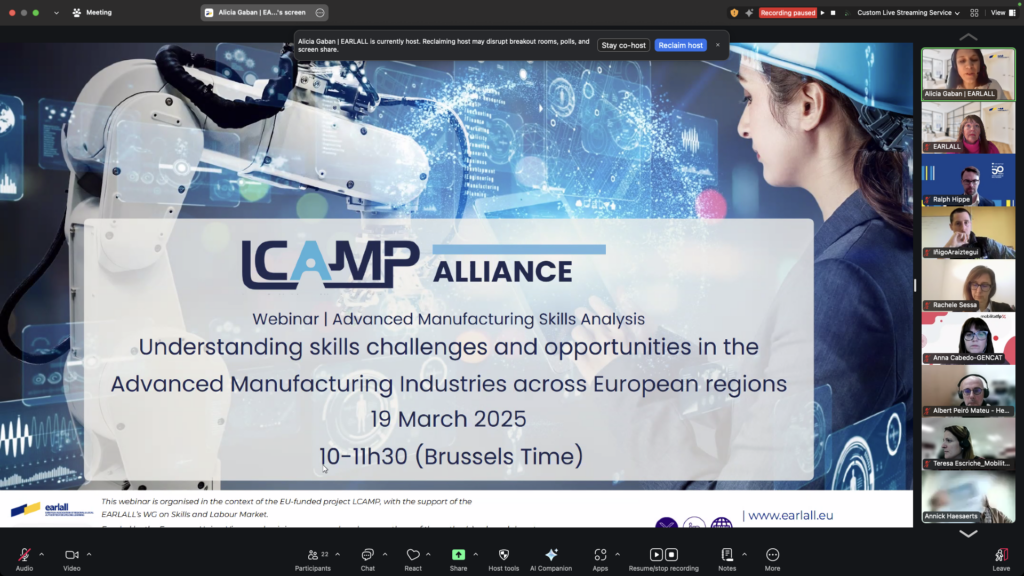
On 19 March 2025, EARLALL, in collaboration with the LCAMP Alliance, hosted a webinar titled “Advanced Manufacturing Skills Analysis: Understanding Skills Challenges and Opportunities in AM Sectors across European Regions.” This event continued EARLALL’s series of sector-focused skills analyses, previously addressing areas such as agriculture, care, the blue economy, textiles, and cultural and creative industries. These webinars are promoted by the EARLALL Working Group on Skills and Labour Market.
The Advanced Manufacturing Sector: An Engine for Innovation
Anna Cabedo, from the Regional Ministry of Education and VET, Catalonia & EARLALL WG Skills and Labour Market leader, acting as the moderator, welcomed participants and introduced the sector context. Advanced Manufacturing (AM) stands at the forefront of Europe’s economic and industrial strategies. It encompasses industries that utilise cutting-edge technologies—including automation, robotics, artificial intelligence, additive manufacturing (3D printing), and the Industrial Internet of Things (IIoT)—to produce high-value products and services. This sector is pivotal to European competitiveness, driving innovation and providing employment across a diverse range of roles, from skilled technicians to engineers and researchers. The sector employs over 30 million workers across Europe, with 20% of these jobs requiring advanced digital and technical skills.
Anna Cabedo then introduced the first speaker, Ralph Hippe, an expert in skills and workplaces at Cedefop. Hippe shared initial findings from Cedefop’s AI skills survey and foresight study, based on a representative sample of 5,342 adult workers across 11 EU countries in 2024.
He highlighted significant disparities in AI adoption across countries and sectors. While AI enhances jobs—especially in routine and middle-skilled roles—it also creates a pressing need for continuous upskilling. Notably, 61% of workers will require new knowledge and skills to adapt to AI’s impact, yet 44% believe their employer is unlikely to provide training.
Hippe underscored that AI transition equals skills transition, emphasizing the need to prioritize AI training for older workers, women, and employees in SMEs. Early findings from the automotive sector revealed key challenges for both education and industry, including a skills gap that education systems currently fail to address. He stressed the necessity of a public-private approach to bridge this gap and ensure a workforce prepared for AI-driven change.
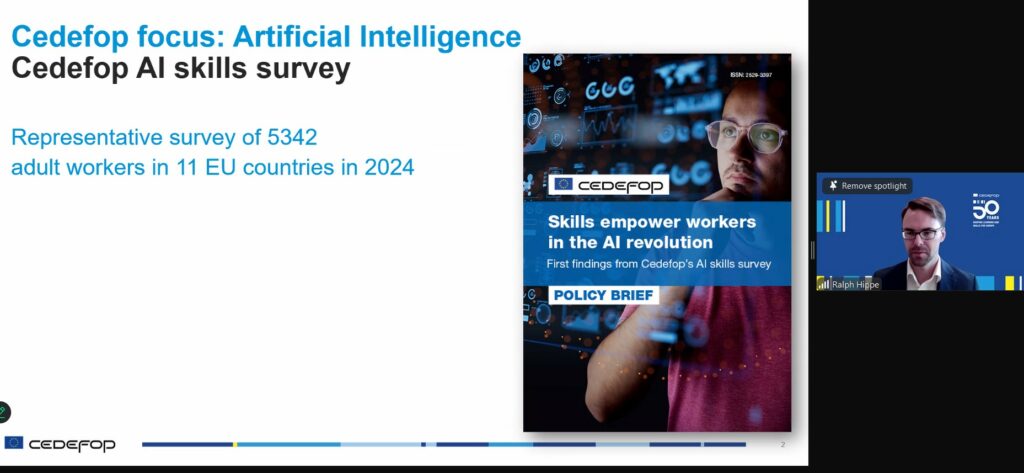
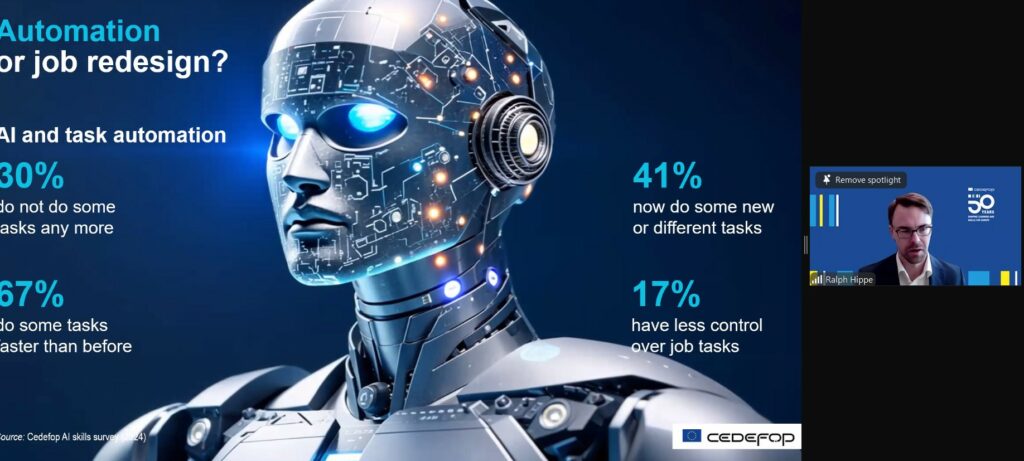
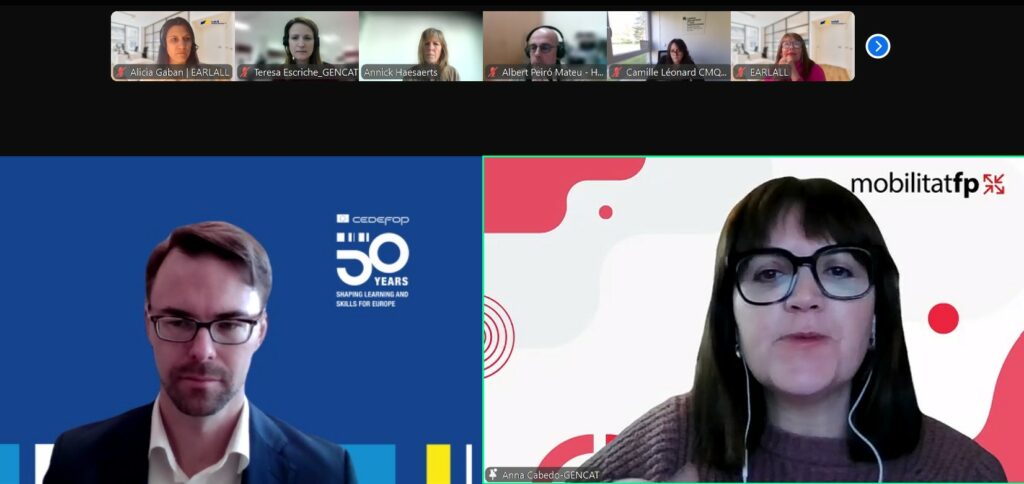
EARLALL Regions sharing AM challenges and opportunities
The regional panel included examples from the Basque Country, Catalonia and Flanders EARLALL regions and Lombardy, highlighting various initiatives and projects at the regional level aimed at improving the AM, including vocational training programs, digital approaches, and awareness campaigns to reach the right people and promote the importance of skills development.
Basque Country: LCAMP project and its impact on the regional VET policies
Iñigo Araiztegui, Director of the Internationalisation Department at Tknika, presented LCAMP (Learner-Centric Advanced Manufacturing Platform for Centres of Vocational Excellence – CoVEs), a European initiative designed to support regional vocational education and training (VET) centres in advanced manufacturing.
The project fosters collaboration among schools on mobility projects, identifies technology trends and skills needs, and develops learning factories within VET environments. Given the significance of advanced manufacturing to the Basque Country’s economy, the LCAMP project is highly relevant to the region. However, advanced manufacturing plays a key role in many European regions, making knowledge-sharing and collaboration essential. Since technology and expertise are largely universal, knowledge developed in one region can be valuable to schools elsewhere.
Recognizing LCAMP’s impact, the Basque Country government incorporated the initiative into its latest regional plan for vocational education and training, elevating CoVEs on the policy agenda. Additionally, 20 VET schools specializing in advanced manufacturing have joined the network. To further support the initiative, the government has promoted the creation of Learning Factories by reducing teaching hours for teachers at 22 VET schools, allowing them time to establish and develop these factories.
Catalonia: looking at EXCEED project, working towards the twin transition
Albert Peiró, Head of Studies at Escola del Treball de Barcelona, provided an overview of Advanced Manufacturing (AM) industries in Catalonia. He noted that the region is home to 1,111 companies in the sector, generating approximately 26,394 jobs. While cybersecurity has the highest number of companies, AI and the Internet of Things (IoT) firms lead in turnover.
Peiró highlighted the importance of projects like EXCEED – Excellence in Green and Digital Manufacturing, which aims to drive innovation and sustainability in AM while ensuring vocational education aligns with future workforce demands. The project focuses on:
- Establishing talent factories
- Innovating curricula
- Developing international talent hubs
- Supporting global mobility programs
A key pillar of EXCEED is its commitment to gender equality. The project has developed a comprehensive Gender Equality Plan for VET providers, reinforcing its dedication to inclusivity and diversity. A standout initiative is Escola del Treball’s EDtWomendays, which includes sessions for primary schools and early secondary education students, encouraging young learners—especially girls—to explore opportunities in advanced manufacturing.
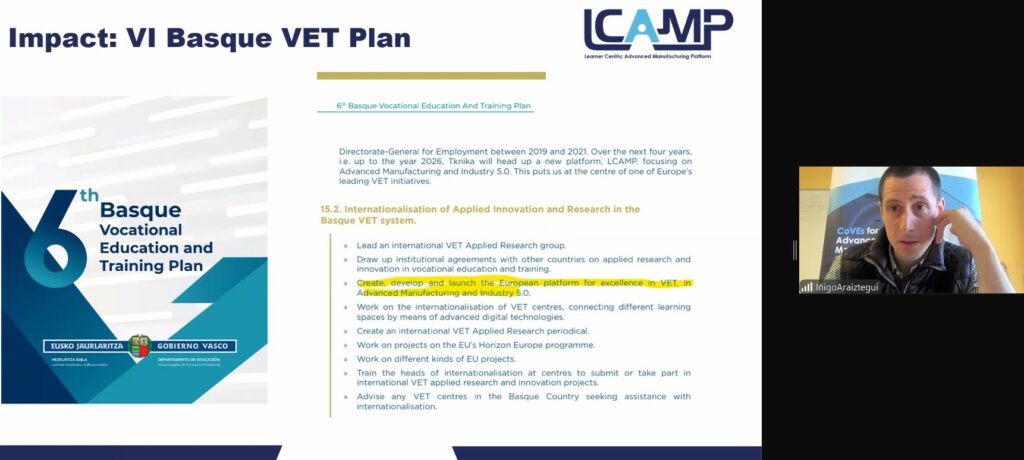
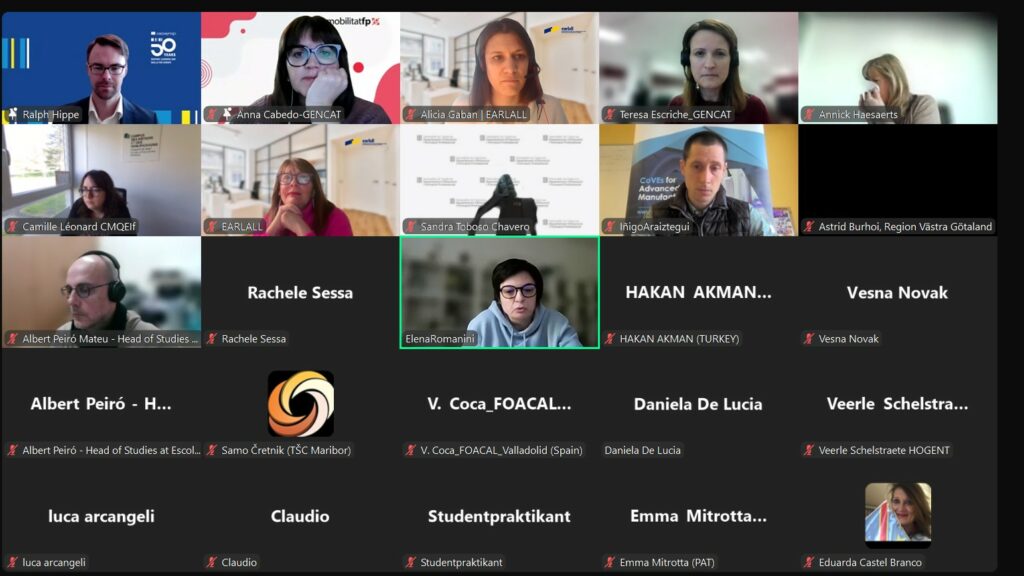
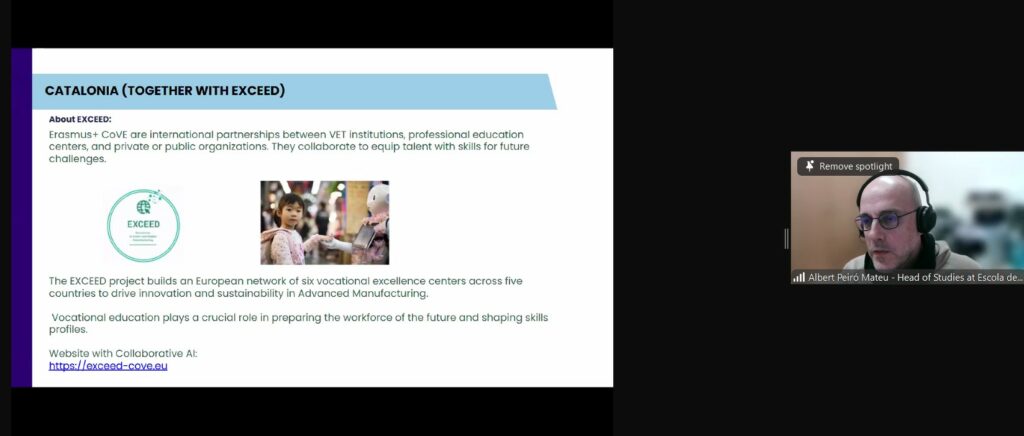
Flanders: labour shortage in the AM Sector and innovative projects
Annick Haesaerts, Policy Officer at GO! Education of the Flemish Community, provided an overview of Belgium’s and Flanders’ labour market and education system. She noted that the manufacturing industry in Belgium employs 573,000 people, representing 11% of the total workforce, with jobs spanning electronics, plastics and synthetic materials processing, mechanical engineering, metal products, textiles, and transport equipment.
Haesaerts highlighted key challenges, including labour shortages caused by the declining appeal of manufacturing careers and skills mismatches between industry needs and available talent. To address these issues, the government is working to revitalize technical and vocational education, foster partnerships between schools and universities, and strengthen technical education through regional technology centres.
She concluded by showcasing initiatives from GO! Education of the Flemish Community, such as:
- Adecco’s Workforce Academy 4.0 – a forklift and reach truck driving program
- Connectief – Diagnose Car – training focused on modern automotive technology
- Wine Harvest – Corda Campus Collaboration – an innovation project with GO! Hotel School
These programs demonstrate ongoing efforts to bridge the gap between education and industry needs while promoting technical and vocational training.
Lombardy, insights from the Fondazione Ergo
Rachele Sessa from Fondazione Ergo discussed efforts to enhance manufacturing productivity and working conditions, with a focus on Italy’s small and medium-sized enterprises (SMEs). While SMEs dominate the Italian manufacturing sector, they often struggle with access to training and innovation. Notably, 38.4% of manufacturing companies have invested in innovation in recent years, yet major challenges remain, including:
- Access to Innovation & Technology – High costs make it difficult for SMEs to invest in automation, AI, and digitalization.
- Skills Gap – Many companies report difficulties in finding qualified talent.
Fondazione Ergo plays a key role in addressing these issues by promoting digitalization, robotics, and sustainability. Acting as a connector within the ecosystem, the foundation collaborates with universities and startups to develop new technologies and support modern industrial transformation.
In March 2024, Fondazione Ergo launched SMARTT Valley, an industrial innovation hub in Varese designed to boost the competitiveness of the local manufacturing industry. The hub is structured around three thematic areas:
- Industrial sustainability
- Social sustainability in factories
- Material sustainability and circularity
SMARTT Valley operates on three pillars: an academy for skills development, a research center, and a technology transfer platform, ensuring that innovation is both accessible and impactful for SMEs.
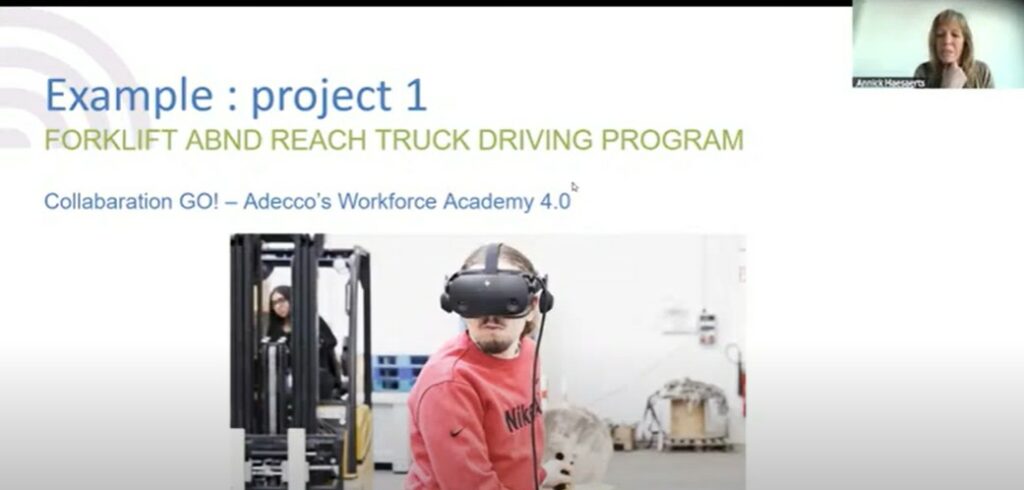
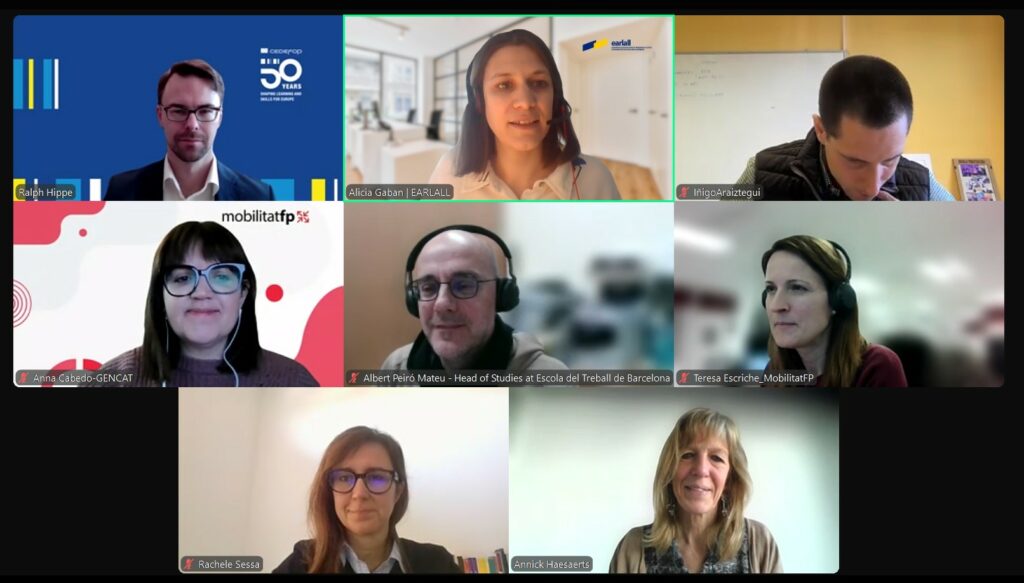
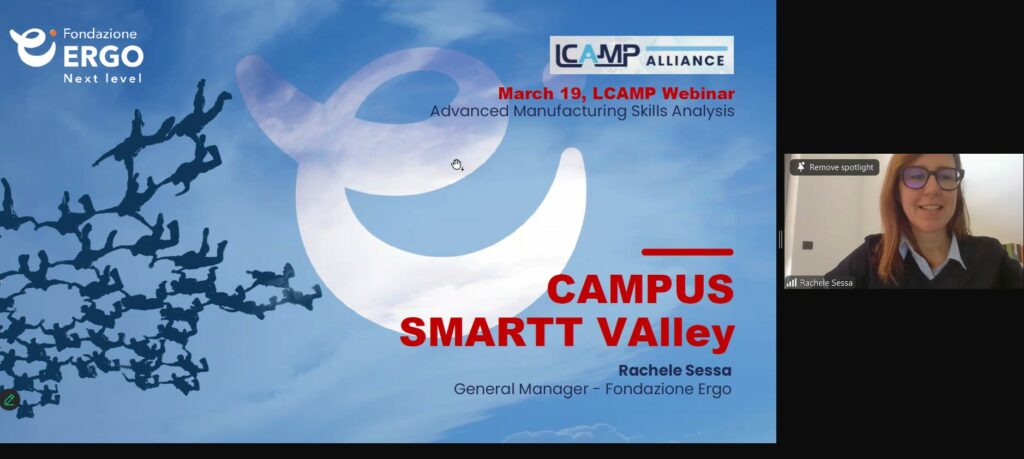
The discussions underscored the critical importance of continuous upskilling and innovation in the manufacturing sector. Addressing skills shortages, particularly in areas like robotics, data analytics, and cybersecurity, is essential for maintaining Europe’s competitiveness in advanced manufacturing. The webinar also highlighted the need for robust public-private collaborations and the development of comprehensive strategies to attract and retain talent in the sector.
By embracing collaboration, innovation, and forward-thinking strategies, Europe can continue to set the global standard in advanced manufacturing. The road ahead presents both challenges and opportunities, requiring industries to invest in new ideas and adapt to rapid technological changes.
This webinar exemplifies the proactive steps being taken across European regions to address the evolving skills landscape in advanced manufacturing, ensuring a resilient and competitive future for the sector.
The next sectoral webinar will be focused on the Tourism industries across European Regions
Resources:
- Presentations
- AI and the EU skilling challenge. First insights from Cedefop’s AI skills survey & foresight study, Ralph Hippe, Expert in skills and workplaces, Department for VET and Skills, Cedefop
- Iñigo Araiztegui, Director of the Inernationalisation Department of Tknika, Basque Country: LCAMP
- Albert Peiró, Head of Studies at Escola del Treball de Barcelona: EXCEED
- Annick Haesaerts, Policy officer at GO! Education of the Flemish Community
- Rachele Sessa, Fondazione Ergo, Lombardy Region
- Watch the recording
- Factsheet




